- Home
- V. E. Schwab
The Near Witch
The Near Witch Read online
CONTENTS
Cover
Also Available from V.E. Schwab and Titan Books
Title Page
Copyright
Dedication
Introduction
The Near Witch
1
2
3
4
5
6
7
8
9
10
11
12
13
14
15
16
17
18
19
20
21
22
23
24
25
26
27
28
29
30
Acknowledgments
The Ash-Born Boy
Prologue
1
2
3
4
5
6
7
8
9
About the Author
ALSO AVAILABLE FROM V.E. SCHWAB AND TITAN BOOKS
Vicious
Vengeful
This Savage Song
Our Dark Duet
A Darker Shade of Magic
A Gathering of Shadows
A Conjuring of Light
The Dark Vault
ALSO AVAILABLE FROM V.E. SCHWAB AND TITAN COMICS
Shades of Magic: The Steel Prince
Shades of Magic: Night of Knives (late 2019)
The Near Witch
Hardback edition ISBN: 9781789091120
Ebook edition ISBN: 9781789091137
Published by Titan Books
A division of Titan Publishing Group Ltd
144 Southwark Street, London SE1 0UP
www.titanbooks.com
First Titan edition: March 2019
10 9 8 7 6 5 4 3 2 1
This is a work of fiction. Names, places and incidents are either products of the author’s imagination or used fictitiously. Any resemblance to actual persons, living or dead (except for satirical purposes), is entirely coincidental.
V.E. Schwab asserts the moral right to be identified as the author of this work.
Copyright © 2011, 2019 V.E. Schwab
No part of this publication may be reproduced, stored in a retrieval system, or transmitted, in any form or by any means without the prior written permission of the publisher, nor be otherwise circulated in any form of binding or cover other than that in which it is published and without a similar condition being imposed on the subsequent purchaser.
A CIP catalogue record for this title is available from the British Library.
To my mother and father, for never once doubting
INTRODUCTION
Many people long to tell a story.
Say to any group, “I write books,” and at least half will respond that, one day, they plan to write one, too. One day, when they have the time. One day, when they have the focus. Some have even started, though few have gotten past the first chapter, or the third, or the fifth.
This isn’t meant as a judgment (the world needs far more readers than writers). I only mean to say that it is no small feat, to write a book. And if you want anyone to read said book, The End is only the beginning. Next, if one has opted to participate in traditional publishing, one must find an agent, a publisher. Then comes revision, sometimes one round, sometimes half a dozen, all to ready the text for an audience, to earn that place on the shelves of a bookstore, and then, a reader’s home.
With so many obstacles between the first flutter of an aspiring author’s imagination and the final product, few stories get to live even a single life on shelves.
Almost none get to live two.
But The Near Witch has been afforded that luxury.
This is the book that, for me, began everything. It wasn’t the first one I wrote—that dubious honor belongs to the plot-less, acid trip of a story I created when I was nineteen and simply longed to discover if I was capable of holding a story in my head for more than a dozen pages, capable of finding The End.
But The Near Witch is the first book that found its way to shelves, to readers.
This, for those who don’t know, is a book about magic.
It is also a book about fear.
Specifically, about the fear of the inside toward the outside, the antagonism between those who belong, and those who don’t. Little did I know then that it would become a theme so central to my work. That all my stories, from A Darker Shade of Magic to Vicious, The Archived to This Savage Song, would center on those who felt lost inside their own worlds, or found inside someone else’s. But at twenty-one, as a second-semester senior at university, stealing hours in a coffee shop each night to write, and as a young adult on the cusp of graduation, and the unknown of life beyond school, I felt pressed between two chapters of my own life, and as if I belonged to neither.
That is the world in which this book was written.
It began with a crack, and a sputter, and a spark.
Those are the opening words of the book, but they could just as easily apply to my career as an author. The Near Witch was a small book, quiet and strange at a time when everything that sold well was loud and vaguely familiar, and though I tried to shield the fragile candle of its life, it was only a matter of time before the wind of publishing blew through, and snuffed it out.
Fortunately, my own flame was more resilient. I kept writing, kept publishing, kept bolstering the fire until it burned hot enough that the seasonal gusts of this wonderful, but fickle industry served to stoke the fire instead of quash it.
Over the next seven years, I wrote fourteen novels. With each one, the readership grew, the books found their audience, a little more with every release, and as the years passed, people began to ask about that first story.
The spark that started the fire.
It is bittersweet, to see a story wanted so long after it was gone, but I harbored a stubborn hope that one day, it would find its way back. Some part of me has been sheltering that matchstick ever since the flame went out.
And here we are.
Back at the beginning.
1
It starts with a crack, a sputter, and a spark. The match hisses to life.
“Please,” comes the small voice behind me.
“It’s late, Wren,” I say. The fire chews on the wooden stem in my hand. I touch the match to each of the three candles gathered on the low chest by the window. “It’s time for bed.”
With the candles all lit, I shake the match and the flame dies, leaving a trail of smoke that curls up against the darkened glass.
Everything seems different at night. Defined. Beyond the window, the world is full of shadows, all pressed together in harsh relief, somehow sharper than they ever were in daylight.
Sounds seem sharper, too, at night. A whistle. A crack. A child’s whisper.
“Just one more,” she pleads, hugging the covers close. I sigh, my back to my little sister, and run my fingers over the tops of the books stacked beside the candles. I feel myself bending.
“It can be a very short one,” she says.
My hand rests against an old green book as the wind hums against the house.
“All right.” I cannot deny my sister anything, it seems. “Just one,” I add, turning back to the bed.
Wren sighs happily against her pillow, and I slip down beside her.
The candles paint pictures of light on the walls of our room. I take a deep breath.
“The wind on the moors is a tricky thing,” I begin, and Wren’s small body sinks deeper into the bed. I imagine she is listening more to the highs and low
s of my voice than the words themselves. We both know the words by heart anyway—I from my father, and Wren from me.
“Of every aspect of the moor, the earth and stone and rain and fire, the wind is the strongest one in Near. Here on the outskirts of the village, the wind is always pressing close, making windows groan. It whispers and it howls and it sings. It can bend its voice and cast it into any shape, long and thin enough to slide beneath the door, stout enough to seem a thing of weight and breath and bone.
“The wind was here when you were born, when I was born, when our house was built, when the Council was formed, and even when the Near Witch lived,” I say with a quiet smile, the way my father always did, because this is where the story starts.
“Long, long ago, the Near Witch lived in a small house on the farthest edge of the village, and she used to sing the hills to sleep.”
Wren pulls the covers up.
“She was very old and very young, depending on which way she turned her head, for no one knows the age of witches. The moor streams were her blood and the moor grass was her skin, and her smile was kind and sharp at once, like the moon in the black, black night…”
I hardly ever get to the end of the story. Soon enough Wren is a pile of blankets and quiet breath, shifting in her heavy dreams beside me. The three candles are still burning on the chest, leaning into one another, dripping and pooling on the wood.
Wren is afraid of the dark. I used to leave the candles lit all night, but she falls asleep so fast, and if she does wake, she often finds her way, eyes closed, into our mother’s room. Now I tend to stay up until she’s drifted off, and then blow the candles out. No need to waste them, or set the house on fire. I slide from the bed, my bare feet settling on the old wood floor.
When I reach the candles, my eyes wander down to the puddles of wax, dotted with tiny fingerprints where Wren likes to stand on her tiptoes and draw patterns in the pools while the wax is warm. I brush my own fingers over them absently, when something, a sliver of movement, draws my eyes up to the window. There’s nothing there. Outside, the night is still and streaked with silver threads of light, and the wind is breathing against the glass, a wobbling hum that causes the old wooden frame to groan.
My fingertips drift up from the wax to the windowsill, feeling the wind through the walls of our house. It’s getting stronger.
When I was small, the wind sang me lullabies. Lilting, humming, high-pitched things, filling the space around me so that even when all seemed quiet, it wasn’t. This is a wind I have lived with.
But tonight it’s different. As if there’s a new thread of music woven in, lower and sadder than the rest. Our house sits at the northern edge of the village of Near, and beyond the weathered glass the moor rolls away like a spool of fabric: hill after hill of wild grass, dotted by rocks, and a rare river or two. There is no end in sight, and the world seems painted in black and white, crisp and still. A few trees jut out of the earth amid the rocks and weeds, but even in this wind it is all strangely static. But I’d swear I saw—
Again something moves.
This time my eyes are keen enough to catch it. At the edge of our yard, the invisible line where the village ends and the moor picks up, a shape moves against the painted night. A shadow twitches and steps forward, catching a slice of moonlight.
I squint, pressing my hands against the cool glass. The shape is a body, but drawn too thin, like the wind is pulling at it, tugging slivers away. The moonlight cuts across the front of the form, over fabric and skin, a throat, a jaw, a cheekbone.
There are no strangers in the town of Near. I have seen every face a thousand times. But not this one.
The figure just stands there, looking out to the side. And yet, he is not all there. There is something in the way the cool blue-white moon lights his face that makes me think I could brush my fingers right through it. His form is smudged at the edges, blurring into the night on either side, as if he’s moving very fast, but it must be the weathered glass, because he’s not moving at all. He is just standing there, looking at nothing.
The candles flicker beside me, and on the moor, the wind picks up and the stranger’s body seems to ripple, fade. Before I know it, I am pressing myself against the window, reaching for the latch to throw it open, to speak, to call the form back, when he moves. He turns his face toward the house and the window, and toward me.
I catch my breath as the stranger’s eyes find mine. Eyes as dark as river stones and yet somehow shining, soaking up moonlight. Eyes that widen a fraction as they meet my own. A single, long, unblinking look. And then in an instant the stranger seems to break apart, a sharp gust of wind tears through, and the shutters slam closed against the glass.
The sound wakes Wren, who mumbles and peels her half-sleeping form from between the sheets, stumbling through the moonlit room. She doesn’t even see me standing at the window, staring at the wooden slats that have blotted out the stranger and the moor. I hear her pad across the threshold, slide open our mother’s door, and disappear within. The room is suddenly quiet. I pry the window open, the wood protesting as it drags against itself, and throw the shutters back.
The stranger is gone.
I feel like there should be a mark in the air where he was wiped away. But there is no trace. No matter how much I stare, there is nothing but trees, and rocks, and rolling hills.
I stare out at this empty landscape, and it seems impossible that I saw him, saw anyone. After all, there are no strangers in the town of Near. There haven’t been since long ago, before I was born, before the house was built, before the Council… And he didn’t even seem real, didn’t seem there. I rub my eyes, and realize I’ve been holding my breath.
I use the air to blow the candles out.
2
“Lexi.”
The light creeps in between the sheets. I pull the blankets up, try to recreate the darkness, and find my mind wandering to the night before, to shadowed forms on the moonlit moor.
“Lexi,” my mother’s voice calls again, this time penetrating the cocoon of blankets. It burrows in beside me along with the morning light. The night-washed memory seems to bleed away.
From my nest I hear the thudding of feet on wood, followed by an airborne pause. I brace myself, staying perfectly still as the body catapults itself onto the bed. Small fingers tap the blankets covering me.
“Lexi,” says a new voice, a higher-pitched version of my mother’s. “Get up now.” Still I feign sleep. “Lexi?”
I shoot my arms out, reaching through the linens for my sister, trapping her in a blanketed hug.
“Got you!” I call. Wren lets out a playful little cry. She wriggles free and I wrestle the blankets off. My dark hair nests around my face. I can feel it, the climbing tendrils already unruly, as Wren sits at the edge of the bed and laughs in her chirping way. Her hair is blond and stock straight. It never leaves the sides of her face, never shifts from her shoulders. I bury my fingers in it, try to mess it up, but she only laughs and shakes her head, and the hair settles, perfect and smooth again.
These are our morning rituals.
Wren hops off and wanders into the kitchen. I’m up and heading to the chest to fetch some clothes, when my eyes flick to the window, examining the glass and the morning beyond. The moor, with its tangled grass and scattered rocks, looks so soft and open, laid out in the light of day. It is a different world in the gray morning. I can’t help but wonder if what I saw last night was just a dream. If he was just a dream.
I touch my fingers to the glass to test the warmth of the day. It is the farthest edge of summer, that brief time where the days can be pleasant, even warm, or crisp and cold. The glass is cool, but my fingertips make only small halos of steam. I pull away.
I do my best to uncoil my hair from my forehead, and wrestle it back into a plait.
“Lexi!” my mother calls again. The bread must be ready.
I pull on a long simple dress, cinching the waist. What I wouldn’t give for pants. I’m
fairly certain my father would have fallen for my mother if she wore britches and a hunting hat, even once she’d reached sixteen, marrying age. My age. Marrying age, I scoff, eyeing a pair of girlish slippers despairingly. They’re pale green, thin-soled, and they make a very poor substitute for my father’s old leather boots.
I stare at my bare feet, marked by the miles they’ve walked across the rough moor. I’d rather stay here and deliver my mother’s bread, rather grow old and crooked like Magda and Dreska Thorne, than be bound up in skirts and slippers and married off to a village boy. I slide the slippers on.
I’m dressed, but can’t shake the feeling I’m missing something. I turn to the small wooden table by my bed and exhale, eyes finding my father’s knife sheathed on its dark leather strap, the handle worn from his grip. I like to place my narrow fingers in the impressions. It’s like I can feel his hand in mine. I used to wear it every day, until Otto’s glares got heavy enough, and even then I’d sometimes chance it. I must be feeling bold today, because my fingers close around the knife, and the weight of it feels good. I slip it around my waist like a belt, the guarded blade against my lower back, and feel safe again. Clothed.
“Lexi, come on!” my mother calls, and I wonder what on earth the hurry could be, since the morning loaves will cool before I ever reach the purchasers, but then a second voice reaches me through the walls, a low, tense muttering that tangles with my mother’s higher tone. Otto. The smell of slightly burned bread greets me as I enter the kitchen.
“Good morning,” I say, meeting the two pairs of eyes, one pale and tired, but unblinking, the other dark and furrowed. My uncle’s eyes are so much like my father’s—the same rich brown, framed by dark lashes—but where my father’s were always dancing, Otto’s are fenced by lines, always still. He hunches forward, his broad shoulders draped over his coffee.
I cross the room and kiss my mother’s cheek.
“About time,” says my uncle. Wren skips in behind me and throws her arms around his waist. He softens a fraction, running his hand lightly over her hair, and then she’s gone, a slip of fabric through the doorway. Otto turns his attention back to me, as if waiting for an answer, an explanation.

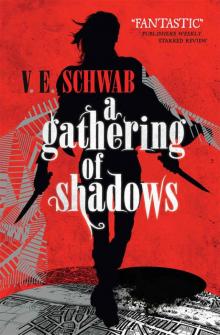 A Gathering of Shadows
A Gathering of Shadows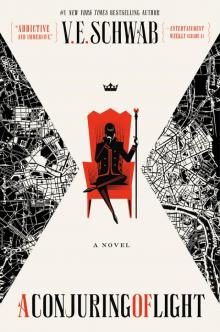 A Conjuring of Light
A Conjuring of Light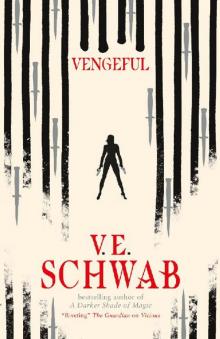 Vengeful
Vengeful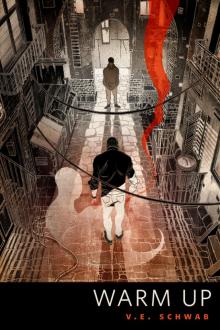 Warm Up
Warm Up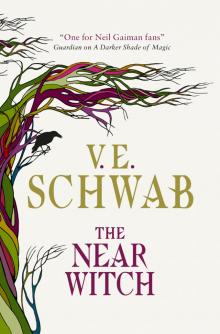 The Near Witch
The Near Witch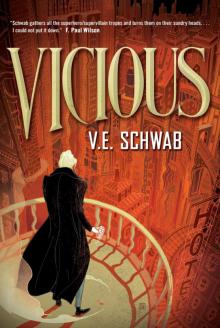 Vicious
Vicious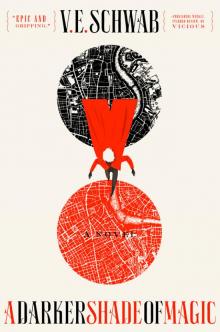 A Darker Shade of Magic
A Darker Shade of Magic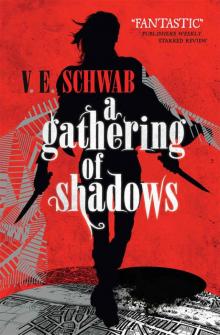 Gathering of Shadows (A Darker Shade of Magic)
Gathering of Shadows (A Darker Shade of Magic)